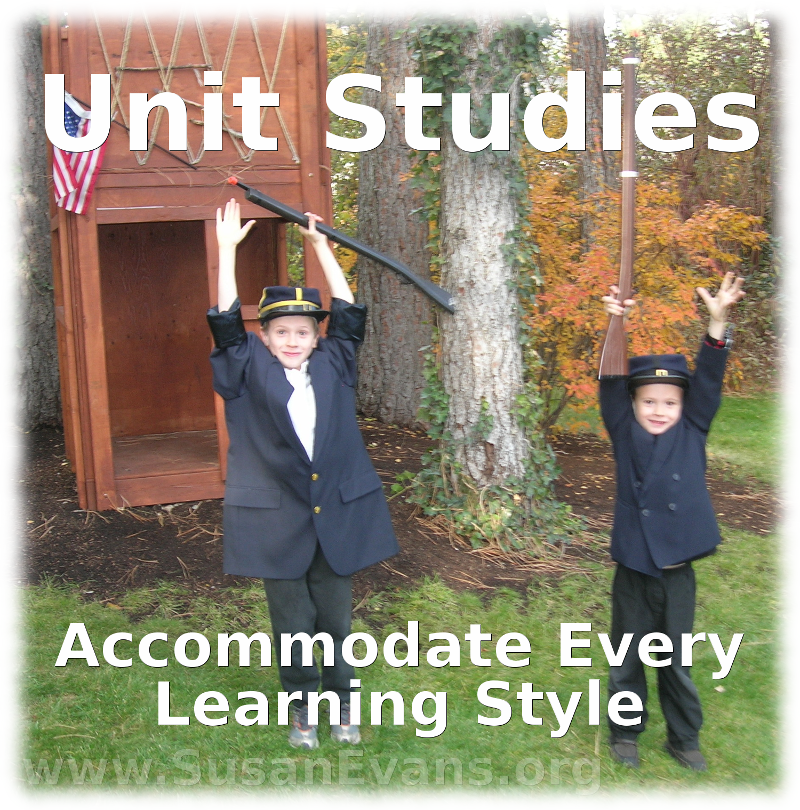Unit Studies are wonderful at accommodating all learning styles. When you tie all your learning together into one theme, you make it come to life for your auditory, visual, and kinesthetic learners. You splash yourself into that topic, grabbing great books and DVD’s about that topic. Let’s say you are studying sharks. You choose books that go in-depth on that topic. Grab a book about sharks and open it. Someone who specializes in sharks wrote this book. If you were reading information about sharks in a textbook, that information was not written by someone who loves and studies sharks; it was written by a person who writes about all topics with generalities.
Learning Styles
In case you are not familiar with learning styles, you will find the three main learning styles below. Auditory learners learn best through their ears, visual learners acquire information through their eyes, and kinesthetic learners understand a topic through hands-on learning. All students master material best through hands-on learning (imagine learning how to drive a car without actually doing it!), but some students prefer to do fewer real-life projects.
1. Auditory Learners
Now read that shark book to your kids. They hear the information from a living book that sounds like it’s coming from a deep sea diver instead of a classroom teacher. DVD’s are also auditory, as the kids can listen to the sloshing sounds of water when a person is in the deep ocean, being circled by shark fins.
2. Visual Learners
The visual learners see all the large, gorgeous shark pictures. Because the pictures are so lovely, your kids are able to identify different kinds of sharks because they are paying attention to the large and gorgeous details. No textbook can possibly have as many gorgeous pictures about sharks as a shark book does. The textbook doesn’t have enough space because it has to cover so many topics in a superficial way that is insipid, boring, and impossible to remember.
3. Kinesthetic Learners
Your kinesthetic or tactile learners love to do hands-on activities. They can go to a city aquarium and see live sharks being fed. The students can watch first hand as the shark’s torpedo-shaped body cuts through the water with alarming speed.
Do you see why unit studies are so brilliant? All of your students can use their best learning style, plus they have a chance to experience the topic.
Come back tomorrow to see why unit studies are superior to textbooks in every topic other than math.
Unit Studies 101
Day 1: What is a Unit Study?
Day 2: Unit Studies Accommodate All Learning Styles (this post)
Day 3: Unit Studies vs. Textbooks
Day 4: Acceleration Through Unit Studies
Day 5: How to Put Together a Unit Study
Tags: Homeschooling, introduction, unit studies, unit study





Great article, Susan. I agree unit studies are great for learning. The more senses you have involved the better whether you are a young or old student.
Exactly! Engage all the senses, and you will have truly experienced the topic to make it unforgettable!
I love unit studies! You were actually one of the 1st blogs I came across while researching them for the 1st time last year! Thanks for all the great info 🙂
How cool that you cane across my blog when researching unit studies! I’ve been doing unit studies for years with my kids, and we love it!
This reminded me of the days when one of my teens was little and he was obsessed with sharks. 🙂 We have about a dozen shark books AND the Shark Week DVDs around here somewhere. …And we’ve been to the Monterey Bay Aquarium several times. I feel like I should get “credit” somewhere for having all the components of a unit study, even though at the time, we were homeschooling from workbooks.
Oh, you were definitely doing a unit study! I bet they’ve never forgotten it either!
Unit studies are so much fun! My kids definitely prefer unit studies to work books and texts! I’m looking forward to picking up some great tips for using unit studies from this series 🙂 Thanks for writing this, Susan!
You’re welcome! Kids get excited when they are invited to experience a topic rather than just read a small bit about it in a textbook!
Multi-sensory is the best way to help kids retain information.
Absolutely!
Another lesson for me in something I had no idea about! Can totally understand and see how beneficial this is to learning. Thanks for teaching me something new again Susan xx
Glad I could be of help!